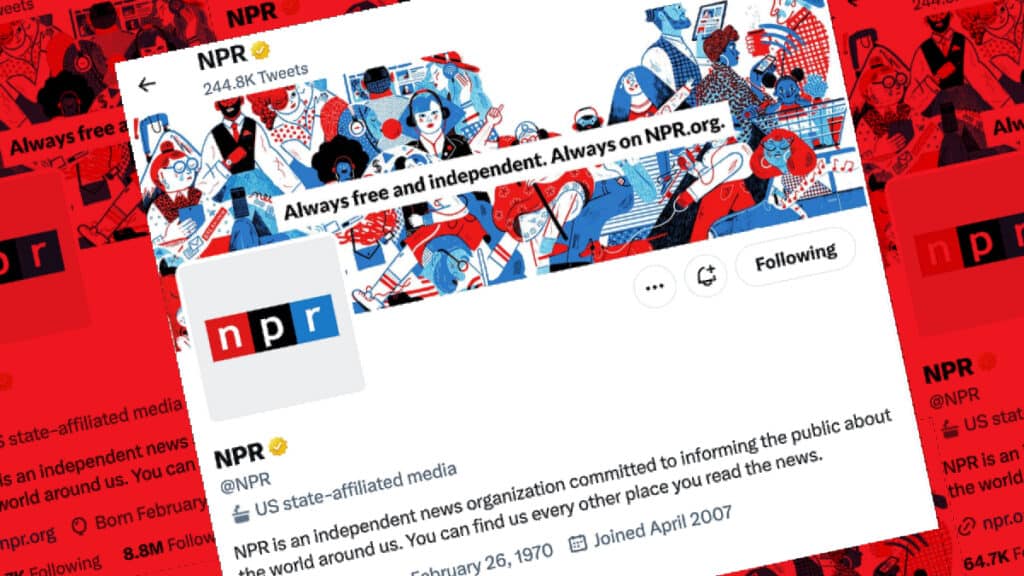NPR is Not RT: Twitter’s New State-Affiliated Media Policy is Misleading
Joseph Bodnar / Apr 7, 2023Joseph Bodnar is a research analyst at the Alliance for Securing Democracy at the German Marshall Fund, where he tracks Russian propaganda and disinformation.

On April 4, Twitter placed a state-affiliated media label on NPR’s account. The label is meant to provide users with context when they see a media account that is under a state’s editorial control, like Russia’s RT and China’s People’s Daily that lack organizational and financial firewalls to insulate their coverage from government interference.
NPR doesn’t fit that description. The outlet gets less than 1% of its funding from the federal government. The other 99% comes largely from corporate sponsorships, membership drives, and fees from affiliate radio stations. This arrangement ensures that NPR remains free from state control. Twitter’s move to add a state media label to NPR’s account therefore equates editorially independent media with propaganda outlets used by autocratic regimes to do things like cover up war crimes and cultural genocide.
At the time Twitter labeled NPR, the platform’s own policy explicitly named the public broadcaster as an example of media that receives state funding but maintains its editorial freedom. NPR did nothing to force Twitter’s policy change. The way the platform makes content moderation decisions changed. A team that understood state-backed media and information campaigns used to oversee those policies. Now, rules are being dictated by a person whose ideas often seem to reflect advice given by trolls.
Regardless, Twitter’s labeling of NPR does not appear to be part of any broader policy change—at least not one that is transparent or well-orchestrated. The move was made without any formal announcement. Twitter had to retroactively adjust its policy after it affixed the label to NPR’s account. And other outlets that have similar financing and editorial operations were not labeled. The arbitrary and opaque character of this move dilutes the legitimacy of state-affiliated labels at a time when they’re needed to help users spot Russia’s wartime propaganda and China’s assertive anti-Western messaging.
NPR does not belong in a category with Moscow and Beijing’s most aggressive propagandists. In the past week, NPR has provided fact-based coverage of human rights issues around the US military base in Guantánamo Bay, oversight issues related to US climate spending, and the history of US presidents making hush money payments. Whatever its flaws, NPR cannot be called a government mouthpiece.
On the other hand, a Russian state media editor once said her organization was akin to Russia’s Defense Ministry and capable of “conducting [an] information war.” Just last week, Kremlin-linked accounts on Twitter prematurely celebrated a Russian imperial victory over a war-torn Ukrainian city, tried to justify Russia’s kidnapping of a Wall Street Journal reporter, and spread unsubstantiated claims about the United States bombing the Nord Stream pipeline.
Similarly, Chinese President Xi Jinping has tasked state media with “tell[ing] China’s story well.” Last week, Beijing-linked media touted China’s global standing and highlighted economic development in Xinjiang—the region where the Chinese Communist Party is targeting Uyghur women, children, and men with coercive population control measures, mass surveillance, forced labor, arbitrary detention, and torture.
Unlike NPR, these Chinese and Russian outlets are neither editorially independent nor driven by a mission to ensure that the powerful are held accountable. These accounts are controlled by dictatorial regimes and peddle content meant to undermine democracy and to justify or cover up large-scale repression and human rights abuses.
Adding to this problem, Twitter has seemingly reversed or abandoned its policy to “not recommend or amplify” accounts or tweets by state-affiliated media. For weeks, Twitter has been promoting Russian and Chinese state media in the “For You” page and through the “who to follow” feature. If the platform decides to downrank NPR content, it will be treating independent media as more harmful than outlets designed to foster autocracy.
Twitter remains a critical place for people to find and understand the news. Unfortunately, the platform’s decision to label NPR as state media has simultaneously undermined the credibility of independent reporting and legitimized outlets backed by Moscow and Beijing. Twitter is fast becoming a safe place for propagandists and a hostile place for the free press.
Authors
